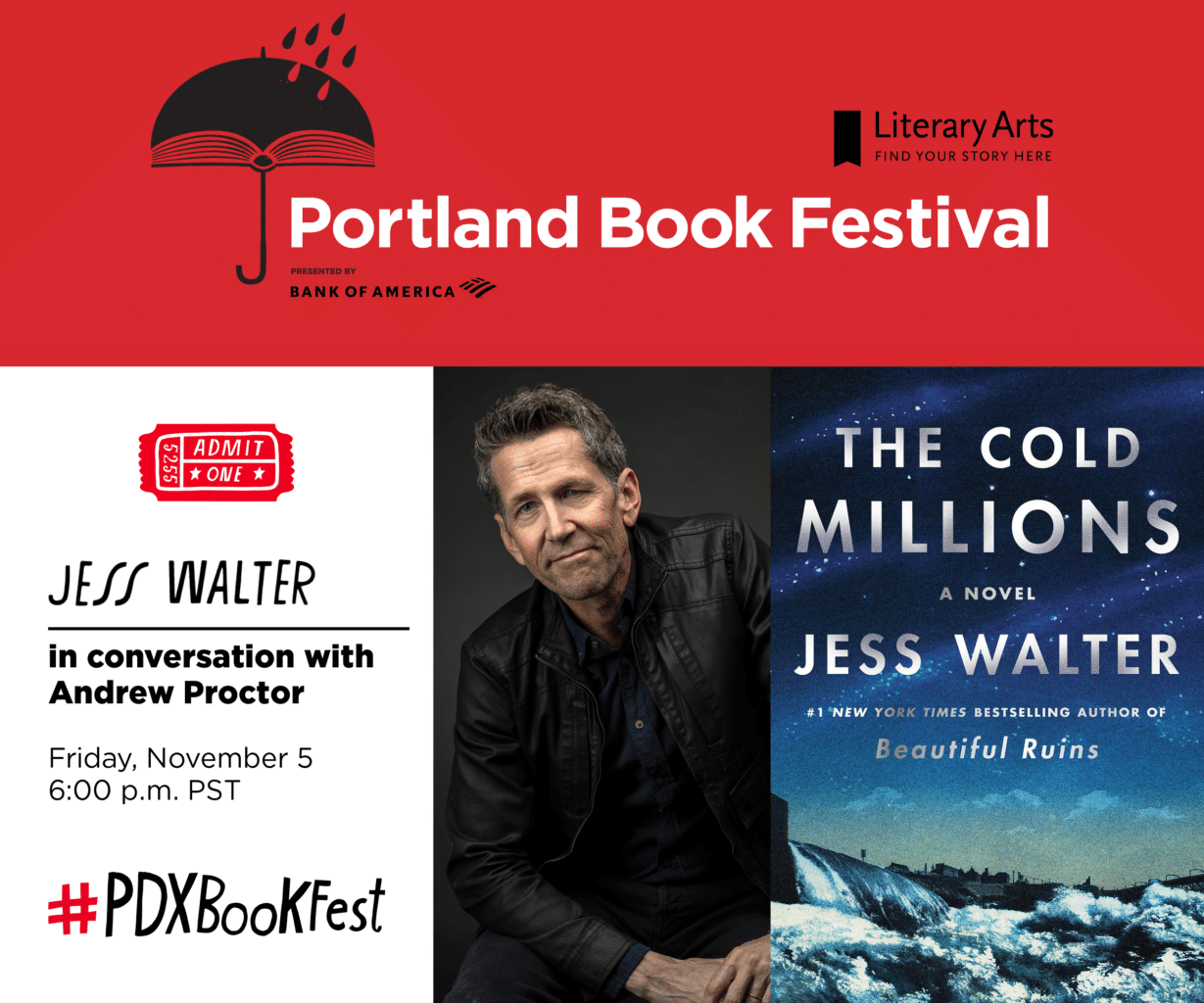By Amy Wang | Read the original post on Oregonlive.
Economic inequality and social unrest propel Jess Walter’s latest novel, “The Cold Millions” (Harper, 352 pages, $28.99), a sprawling novel whose larger-than-life characters – a mix of historical and fictional figures – mingle amid Spokane’s heyday just after the turn of the 20th century.
Gig and Rye Dolan, orphaned brothers barely keeping body and soul together, escort us into Walter’s almost cinematic world, leading us from corrupt cops and job brokers to hard-eyed burlesque girls and Pinkerton detectives to self-indulgent robber barons and idealistic union recruiters.
Walter will discuss the novel, which publishes Tuesday, Oct. 27, with Andrew Proctor, executive director of the Portland nonprofit Literary Arts, at 6 p.m. Nov. 5 as part of Literary Arts’ virtual Portland Book Festival. While most festival events are free, admission to this one requires purchasing the $28.99 book at Powells.com.
Walter, a third-generation Spokane resident, identifies firmly as a working-class writer. He said he was the first male in his family to graduate from high school and the first person in his family to graduate from college. He described his grandfathers as itinerant laborers, one of whom died in a worksite accident, and his father as a onetime steelworker.
“It’s very much in my bones, the unfairness,” Walter said in a recent interview with The Oregonian/OregonLive. “And to see the way much of the working class has been separated from building in their own interests breaks my heart.”
Here are five takeaways from the interview.
“The Cold Millions” was inspired by Walter’s desire to write about the economic and social issues of the early 20th century.
“We have heard for the last decade or more that this is the largest inequality in wealth and income since the Gilded Age,” Walter said. While the phrase “Gilded Age” usually summons images of East Coast wealth, “I was drawn to that period of the Northwest when you had these timber and mining magnates and the rest of the people were really living hand to mouth, moment to moment, with no guarantee of an eight-hour workday or any sort of job security.”
His characters orbit around the 1909 free-speech protests in Spokane, when the Industrial Workers of the World pushed back against a ban on street speaking that was meant to stymie union organizing efforts. The protests “just struck me as this fascinating thing to create a fiction around,” Walter said.
“The Cold Millions” is set during a key moment of transition.
Walter said he was drawn to the idea of a frontier town “bumping up against the modern moment,” with horses and automobiles both on the streets, and brothels and saloons prospering amid a rising religious and temperance tide that would lead to Prohibition.
In that era, Spokane was a city of extremes, too. “All of that mining and timber wealth from western Montana, from Idaho, from Washington, all of the agricultural wealth, all of it pooled in Spokane,” Walter said, and so did thousands of itinerant workers, a clash he explores in the novel.
“The Cold Millions” is a nod to young, idealistic activists.
The protagonist is 17; other characters, not much older. Historical figures include Elizabeth Gurley Flynn, a 19-year-old union activist who leads the free speech protests and who, to Walter, echoed today’s young people protesting for gun control, climate legislation and more.
The labor movement was young as well – Walter noted the “innocence” of the IWW “saying all you had to do was be alive and have a job, and you could start a union and be guaranteed basic rights.”
“The Cold Millions” revels in the language of the time.
“I immersed myself in reading from that period and the voices are just so contagious,” Walter said. Take his character Del, an out-of-town detective who mutters that Spokane gives him the “morbs,” or a feeling of unease.
“I just thought, why did we let that word go?” Walter said. “I really wanted to portray that richness of the language at the time and to use it to really propel the voice of the story.”
“If you look back at what was happening in the West during that time – anarchists planting bombs and police and goons beating protesters – these were wild times and I wanted the action and the language both to reflect just what a wild time it was.”
“The Cold Millions” refers to the millions left in the cold while a few relax in the warm glow of wealth.
Walter wrote a scene in which the main character was sitting in a rich man’s private library and thinking of his brother’s few shabby volumes. “He was having this sort of reverie, that sort of brokenhearted moment, when he first encountered wealth at such a level that it made him realize the deep unfairness with which his life had been led … he was weeping for the cold millions out there.”



